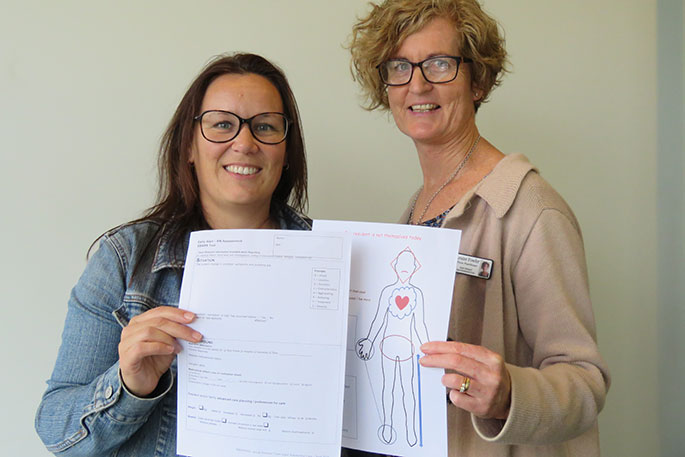Healthcare assistants and nurses working in aged care have new tools for assessing the health of elderly patients thanks to an ‘early alert' project by the Western Bay of Plenty Primary Health Organisation.
One of the tools has been adapted for use by the Health Quality & Safety Commission of New Zealand and is included in the latest Frailty Care Guides for aged residential care.
Nurse practitioner Louise Fowler and clinical resource nurse Kate O'Dwyer from the WBOP PHO's Acute Demand Aged Residential Care team (ARC) worked with Tauranga aged care providers over the past 18 months to develop the tools.
With more than 1900 elderly patients in 32 aged care facilities throughout the Western Bay of Plenty, the PHO wanted to find a way to support the aged care workforce to pick up early signs of health deterioration.
'A lot of elderly patients have complex medical needs and the aged care sector traditionally has a high staff turnover, so upskilling staff is a challenge,” says Louise.
'Working in the sector over the past four years I realised we needed a tool, and a process where nurses could identify residents who were deteriorating and deal with it in a timely manner so if it was reversible, it could be reversed.”
The first people to recognise that patients are unwell are often healthcare assistants, so a tool was developed to help them identify symptoms.
The tool is a basic diagram of a person and a list of ailments they might be experiencing, such as confusion, shortness of breath, pain, or eating and drinking less.
The healthcare assistant passes this on to a registered nurse (RN) who then carries out a full head-to-toe check using a second assessment tool.
'By looking at every system in the body they can use clinical reasoning to identify what is wrong,” says Louise.
'This helps the nurses to have full information to then either treat the patient or escalate the concern to a clinical nurse manager or GP. It gives everyone a voice and ensures that concerns are followed up.”
The ARC team is pleased with the positive feedback received from the facilities that have used the tools, and the inclusion of the RN assessment tool in the new Frailty Care Guidelines.
'Nurses have reported that it is a useful tool, or prompt, providing a structured format to communicate clinical information to GPs. Alongside the tool we have been going into facilities and working with nurses to increase their clinical assessment skills, which they have also appreciated,” says Kate.
Registered nurse Karen Pope, who works at aged residential care facility Hodgson House in Tauranga, agrees it is 'a great tool” that has allowed her to pick up health problems in patients earlier and given her more confidence in her clinical assessment.
Aspen Rest Home clinical manager Gurjit Kaur says the information in the new tools is 'concise and appropriate” and resulted in more detailed reporting of patients' conditions. Staff also feel empowered and more confident in their assessment skills, she says.
Louise says early results show fewer Emergency Department attendances of patients from some of the aged care facilities involved in the project since the tool was introduced, which means potential health problems are being reversed at an earlier stage.
Posted: 01:52pm Fri 06 Dec, 2019
New tools pick up health problems in elderly

Kate O’Dwyer, left, and Louise Fowler from the Western Bay of Plenty Primary Health Organisation with the assessment tools they have developed for healthcare assistants and nurses working in aged care facilities. Image: Supplied.


0 comments
Leave a Comment
You must be logged in to make a comment.